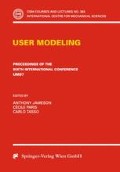Abstract
This paper describes the student modeling component of Andes, an Intelligent Tutoring System for Newtonian physics. Andes’ student model uses a Bayesian network to do long-term knowledge assessment, plan recognition and prediction of students’ actions during problem solving. The network is updated in real time, using an approximate anytime algorithm based on stochastic sampling, as a student solves problems with Andes. The information in the student model is used by Andes’ Help system to tailor its support when the student reaches impasses in the problem solving process. In this paper, we describe the knowledge structures represented in the student model and discuss the implementation of the Bayesian network assessor. We also present a preliminary evaluation of the time performance of stochastic sampling algorithms to update the network.
This research is supported by AFOSR under grant number F49620-96-1-0180, by ONR’s Cognitive Science Division under grant N00014-96-1-0260 and by DARPA’s Computer Aided Education and Training Initiative under grant N66001-95-C-8367. In addition, Dr. Druzdzel was supported by the National Science Foundation under Faculty Early Career Development (CAREER) Program, grant IRI-9624629. We would like to thank Zhendong Niu and Yan Lin for programming support.
Access this chapter
Tax calculation will be finalised at checkout
Purchases are for personal use only
Preview
Unable to display preview. Download preview PDF.
References
Anderson, J., Corbett, A., Koedinger, K., and Pelletier, R. (1995). Cognitive tutors: Lessons learned. The Journal of the Learning Sciences 4(2): 167–207.
Carberry, S. (1990). Incorporating default inferences into plan recognition. In Proceedings of the 8th National Conference on Artificial Intelligence, 471–478.
Charniak, E., and Goldman, R. (1993). A Bayesian model of plan recognition. Artificial Intelligence 64(l):53–79.
Collins, J. A., Greer, J. E., and Huang, S. X. (1996). Adaptive assessment using granularity hierarchies and Bayesian nets. In Frasson, C., Gauthier, G., and Lesgold, A., eds., Proceedings of the 3rd International Conference on Intelligent Tutoring Systems ITS ’96. Berlin: Springer. 569–577.
Conati, C., and VanLehn, K. (1996a). POLA: a student modeling framework for Probabilistic On-Line Assessment of problem solving performance. In Proceedings of the 5th International Conference on User Modeling, 75–82.
Conati, C., and VanLehn, K. (1996b). Probabilistic plan recognition for cognitive apprenticeship. In Proceedings of the 18th Annual Conference of the Cognitive Science Society, 403–408.
Cousins, S., Chen, W., and Frisse, M. (1993). A tutorial introduction to stochastic simulation algorithms for belief networks. Artificial Intelligence in Medicine 5:315–340.
Druzdzel, M. J., and Suermondt, H. J. (1994). Relevance in probabilistic models: “Backyards” in a “small world”. In Working notes of the AAAI-1994 Fall Symposium Series: Relevance, 60–63.
Genesereth, M. (1982). The role of plans in intelligent teaching systems. In Sleeman, D., and Brown, J. S., eds., Intelligent Tutoring Systems. New York: Academic Press. 137–156.
Gitomer, D., Steinberg, H.S.L., and Mislevy, R. J. (1995). Diagnostic assessment of troubleshooting skill in an intelligent tutoring system. In Nichols, P., Chipman, S., and Brennan, R., L., eds., Cognitively Diagnostic Assessment. Hillsdale, NJ: Erlbaum.
Henrion, M. (1989). Some practical issues in constructing belief networks. In Kanal, L. N., Levitt, T. S., and Lemmer, J. F., eds., Proceedings of the 3rd Conference on Uncertainty in Artificial Intelligence, 161–173. Elsevier Science Publishers.
Huber, M., Durfee, E., and Wellman, M. (1994). The automated mapping of plans for plan recognition. In Proceedings of the 10th Conference on Uncertainty in Artificial Intelligence, 344–351.
Jameson, A. (1996). Numerical uncertainty management in user and student modeling: An overview of systems and issues. User Modeling and User-Adapted Interaction 5(3–4): 193–251.
Kohen, G., and Greer, J. (1993). Recognizing plans in instructional systems using granularity. In Proceedings of the 4th International Conference on User Modeling, 133–138.
Lin, Y., and Druzdzel, M. J. (1997). Computational advantages of relevance reasoning in Bayesian belief networks. In Proceedings of the 13th Conference on Uncertainty in Artificial Intelligence. To appear.
Martin, J., and VanLehn, K. (1995). A Bayesian approach to cognitive assessment. In Nichols, P., Chipman, S., and Brennan, R. L., eds., Cognitively Diagnostic Assessment. Hillsdale, NJ: Erlbaum.
Mislevy, R. J. (1995). Probability-based inference in cognitive diagnosis. In Nichols, P., Chipman, S., and Brennan, R., L., eds., Cognitively Diagnostic Assessment. Hillsdale, NJ: Erlbaum.
Pearl, J. (1988). Probabilistic Reasoning in Intelligent Systems: Networks of Plausible inference. Los Altos, CA: Morgan Kaufmann.
Petrushin, V. A., and Sinitsa, K. M. (1993). Using probabilistic reasoning techniques for learner modeling. In Proceedings of the 1993 World Conference on AI and Education, 426–432.
Pynadath, D. V., and Wellman, M. P. (1995). Accounting for context in plan recognition, with application to traffic monitoring. In Proceedings of the 11h Conference on Uncertainty in Artificial Intelligence, 472–481.
Ross, P., and Lewis, J. (1988). Plan recognition for intelligent tutoring systems. In Ercoli, P., and Lewis, R., eds., Artificial Intelligence Tools in Education. Amsterdam: Elsevier Science Publishers. 29–37.
Self, J. (1988). Bypassing the intractable problem of student modeling. In Proceedings of Intelligent Tutoring Systems ’88, 18–24.
VanLehn, K., Jones, R. M., and Chi, M. T. H. (1992). A model of the self-explanation effect. The Journal of the Learning Sciences 2(1): 1–59.
VanLehn, K. (1996). Conceptual and meta learning during coached problem solving. In Frasson, C., Gauthier, G., and Lesgold, A., eds., Proceedings of the 3rd International Conference on Intelligent Tutoring Systems ITS ’96. Berlin: Springer. 29–47.
Author information
Authors and Affiliations
Editor information
Editors and Affiliations
Rights and permissions
Copyright information
© 1997 Springer-Verlag Wien
About this paper
Cite this paper
Conati, C., Gertner, A.S., VanLehn, K., Druzdzel, M.J. (1997). On-Line Student Modeling for Coached Problem Solving Using Bayesian Networks. In: Jameson, A., Paris, C., Tasso, C. (eds) User Modeling. International Centre for Mechanical Sciences, vol 383. Springer, Vienna. https://doi.org/10.1007/978-3-7091-2670-7_24
Download citation
DOI: https://doi.org/10.1007/978-3-7091-2670-7_24
Publisher Name: Springer, Vienna
Print ISBN: 978-3-211-82906-6
Online ISBN: 978-3-7091-2670-7
eBook Packages: Springer Book Archive

